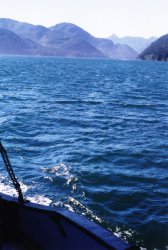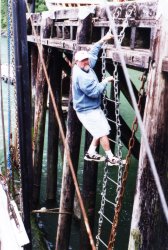|


- Is there power or phone on board?
- What if I get seasick?
- Will I enjoy this trip?
- Can the mission boat accommodate people with health problems?
- Will we have time for fishing or exploring?
- Are there age requirements?
- What are the costs to participate?
- What should I bring?
- What shouldn't I bring?
IS THERE POWER OR PHONE ON BOARD?
There is limited power on board while we are at sea, but when we are docked we will normally have shore power. It is best that we don't overtax the hydro so please do not bring blow dryers or electric shavers. A telephone may be available for emergencies only, calls of a social nature must be done ashore at phone booths. Check the calendar of your voyage, whenever you are docked there may be a phone if you need to check in with families. Please note that the schedule may change due to weather or the crew's desire to stay longer in one spot to continue God's work.
WHAT IF I GET SEASICK?
When travelling inner waters, seasickness is usually not an issue. Open water travel will not occur if the winds are high, so if this occurs we will not travel until the weather calms down. 
If you should feel queasy, there are several solutions:
- Some people find fresh air on deck and keeping their eyes on the horizon helpful
- Some find that immediately lying down and closing their eyes solves the problem.
- You may wish to bring motion sickness medication (please ask your doctor).
- You may wish to try seabands (available at marina stores and some drug stores).
Many people find that eating light and sleeping long for the first few days helps them get their sea legs.
WILL I ENJOY THIS TRIP?
Coming to a mission experience, the primary purpose is to share the word of God and his love. The mission boat experience will give you that opportunity which many crew have found to be uplifting and truly spiritually renewing. In our fast paced world there are many distractions, on the mission boat there are no distractions and crew are able to focus on God's word, what it means in their lives and how they can share it's meaning with others. It is important to remember that the accommodations are comfortable but rustic and that the crew shares a relatively small indoor living space. The ability to laugh together is a gift that we make frequent use of. The opportunity to witness to others, coupled with the breathtaking scenery of snow capped mountains and the sea, and the opportunity to see wildlife that many people have never had the chance to see in their natural environments, makes the voyage of the mission boat very special for the crew.

CAN THE MISSION BOAT ACCOMMODATE PEOPLE WITH HEALTH PROBLEMS?
Should you have special health concerns, please tell us so that we can help you discern if boating is for you. There will be times when we are several hours from any kind of emergency care facility, if you have a condition that may require such care than the mission boat experience may not be suitable. Please look at the Land Based Mission Teams opportunities that are land based.
Living on board a boat is like being in a recreational vehicle. Please note that the bunks where the crew sleep (picture a bunk bed), have upper and lower bunks, and some may find them challenging to get into and out of . Anyone with back problems or restricted mobility may find this quite difficult.
There are ramps and ladders you will have to be able to climb to get from the boat to shore. Occasionally, we will need to anchor, instead of tie up at a dock, and you will need to be able to climb into a skiff (smaller boat) to go ashore. A good comparison would be climbing over a 4-5 foot fence. There is a 15 foot tide on the British Columbia coast, so when the boat is tied up, it floats up and down as the tide changes, while the pier does not. This means that you may have to climb 15 feet up a chain or aluminium ladder. All crew must be able to get on and off the boat safely by themselves, with little assistance.

A sense of balance is important. Small movements of the boat can cause a slight sway that you will quickly become accustomed to, however, if you have any condition that affects your balance it may not be safe for you on the boat.
WILL WE HAVE TIME FOR FISHING OR EXPLORING ?
Yes, there will be pockets of time in each week where the crew will be able to explore on land or by skiff. There should There will be limited fishing gear on board, so if you have your own by all means bring it. There may also be the opportunity for crabbing. A valid salt water fishing license will be required, and can be purchased at most marina stores.
ARE THERE AGE REQUIREMENTS?
Youth age 16 and over are encouraged to join the mission. If there are special circumstances you wish to discuss, please contact us.
WHAT ARE THE COSTS TO PARTICIPATE?
There is a suggested donation which has been developed based on the expenses of travel, food and outreach program costs. The suggested crew member donation is $675 CDN per week. A Land Team member's cost will vary based on the sharing of expenses and size of the group. Land Based Mission Teams are asked to pay $250 CDN per team for administrative expenses.

WHAT SHOULD I BRING? WHAT SHOULDN'T I BRING?
Space for storage aboard is limited, so pack as light as possible. Duffel bags are easier to store than suitcases. Bring your own towel and toiletries. All bedding is provided. If you have a special pillow you are welcome to bring it.
There is no washer or dryer on board, but some of the larger docks we stop at may have Laundromats.
Don't bring your best 'whites' on board. No matter how well maintained we can be, there will be grease and other things that may stain your Sunday bests. All of the locations at which we stop will be informal, so casual clothes are best.
Layering is the best way to dress. The weather on the coast in the summer is quite variable. It can be very warm in the galley area. There is normally always a breeze on the water. Expect temperatures to range from the 50's to the 80's (Fahrenheit).
CLOTHING NEEDS:
- warm jacket or wind breaker (evenings can still be breezy and cold)
- disposable rain poncho (if your jacket is not water repellent)
- sweat and T-shirts
- jeans
- shorts
- bathing suit if you plan on going swimming (the water will be cold: 62-68°F]
- towels
- thongs (for use in showers)
- comfortable walking shoes or hiking boots
- sunglasses, sun hat and sunscreen
- personal needs (we will provide soap and shampoo on board)
- ear plugs (if you will require them to sleep)
- extra things to do, we have some books and games but we encourage anything special that you can add to our time together (e.g.: musical instrument, sharing of stories, special books etc..)
- conservative sleep wear as the sleeping accommodations are quite communal - many people find light jogging wear most comfortable).
DO NOT BRING
- Walkman or personal CD players (you will be asked to put them away)
- Alcohol
- Sleeping bags or blankets
- Food
- Pets

|



